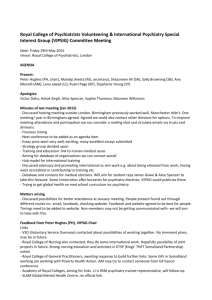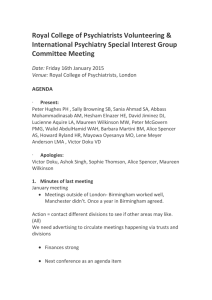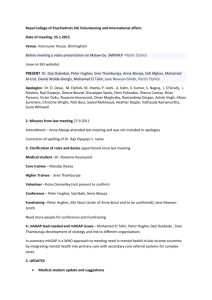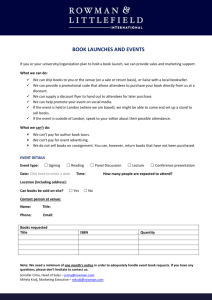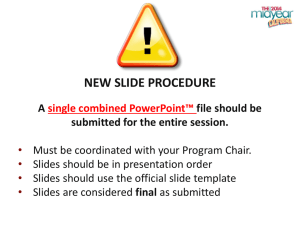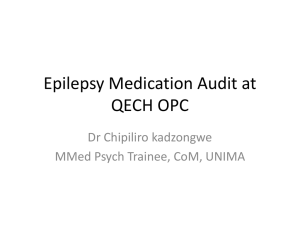mhGAP Orientation Workshop Report
advertisement
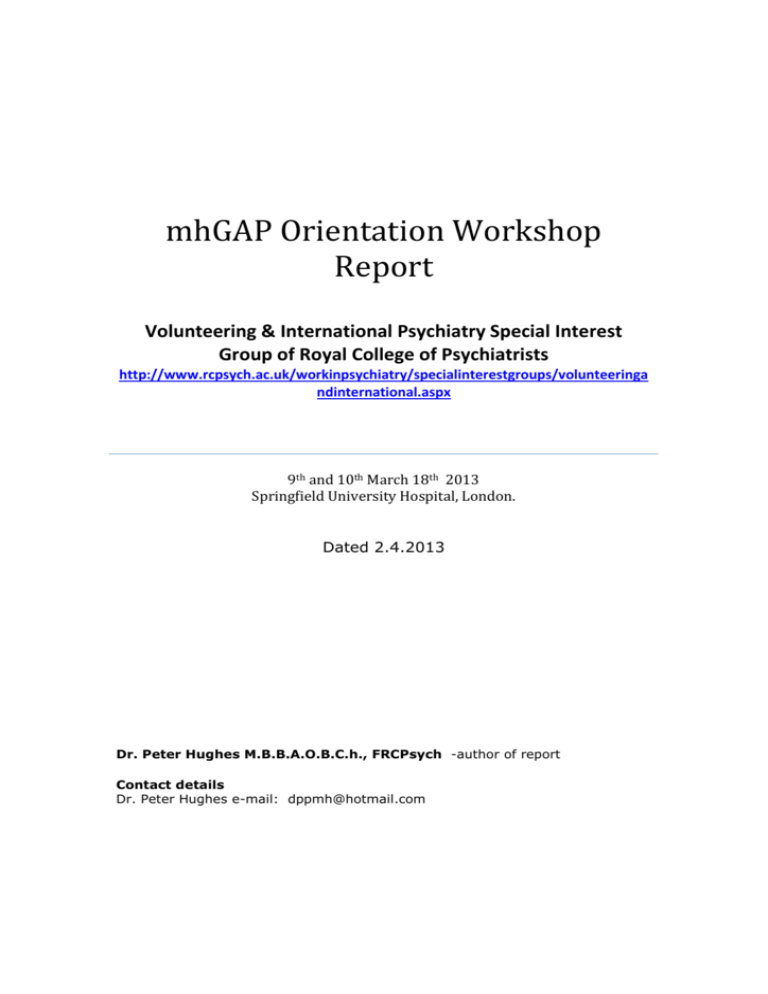
mhGAP Orientation Workshop Report Volunteering & International Psychiatry Special Interest Group of Royal College of Psychiatrists http://www.rcpsych.ac.uk/workinpsychiatry/specialinterestgroups/volunteeringa ndinternational.aspx 9th and 10th March 18th 2013 Springfield University Hospital, London. Dated 2.4.2013 Dr. Peter Hughes M.B.B.A.O.B.C.h., FRCPsych -author of report Contact details Dr. Peter Hughes e-mail: dppmh@hotmail.com List of abbreviations and acronyms IG mhGAP mhGAP-IG MNS NGO PHC RCP ToT WHO VIPSIG Intervention Guide Mental Health Gap Action Programme Mental Health GAP Action Programme - Intervention Guide Mental, Neurological and Substance abuse Non governmental organisation Primary Health Care Royal College of Psychiatrists Training of Trainers World Health Organisation Volunteering and International Psychiatry Special Interest Group mhGAP Modules Abbreviations GPC DEP PSY EPI DEV BEH DEM ALC DRU SUI BPD OTH BASE Course STANDARD Course General Principles of Care Depression Psychosis Epilepsy Developmental Disorders Behavioural Disorders Dementia Alcohol Use and Alcohol Use Disorders Drug Use and Drug Use Disorders Suicide and Self-Harm Bipolar Disorder Other Significant Emotional or Medically Unexplained Complaints Modules covered including assessment and some management advice Modules covered including assessment and all of management Acknowledgements I thank the Adult Faculty of the Royal College of Psychiatrists for supporting this orientation, Springfield University Hospital for hosting, Sue Duncan at College of Psychiatry, Dr. Sophia Thomson, Dr. Mandip Jheeta and all participants. Introduction and objectives of the orientation expercise. This report describes the mhGAP Orientation Workshop organised by Dr. Peter Hughes, Dr. Sophia Thomson and Dr. Mandip Jheeta of the Volunteering and International Psychiatry Special Interest Group. The Adult Faculty of the Royal College of Psychiatry generously donated £5,000 over 2 financial years to establish an mhGAP based education and support of field-work. This educational event is the first part of this programme. mhGAP is a WHO programme initiated in 2008 designed to scale up care for mental, neurological and substance use disorders among non-specialist providers, including primary health care. The objective is to scale up mental health care in resource poor settings to address the gap in mental health care unmet needs of persons suffering from MNS disorders. Objectives of the orientation exercise Objectives of the orientation Introduce mhGAP IG to an audience of UK based mental health professionals Generate enthusiasm, future training and field opportunities Generate familiarity with the mhGAP programme, mhGAP-IG and the concept of the draft facilitator guides. Facilitate basic skills of mhGAP working and teaching. Develop a mind-set that is PHC centred rather than secondary care. Teaching skills in mhGAP on assessment, diagnosis and management of priority conditions Facilitate General Principles of Care as an overarching concept that covers all further teaching. Improve teaching skills amongst the participants by modelling and active participation. Master various models of training methodology and training techniques, facilitator skills and some supervision skills Communication skills Focus on development of role-play as a core teaching methodology in a very practical way. Generate a body of interest for further projects Develop momentum for special Interest group Preparation for conference The idea for this conference came up at previous VIPSIG meetings in 2012. A bid was made to the Adult Faculty of RCP following discussions. The VIPSIG was successful. It was necessary to make use of the funding offered within the financial year generating a need to move fast with Orientation. The core group of organisers were Dr. Peter Hughes, Sophia Thomson and Mandip jheeta. Dr. Peter Hughes had been engaged in some WHO consultancies on mhGAP programme and was able to use some of that expertise for generating the programme. Dr. Sophia Thomson had been involved as well as Dr. Peter Hughes in Sudan in mhGAP training with WHO and Sudan Ministry of Health. A flyer was sent to members of the VIPSIG to invite to attend. Administration was based through RCP office and thanks to Sue Duncan for all this work. Others were invited through informal contacts and word of mouth. Springfield University Hospital gave a venue for free for the 2-day event. 20 mhGAP books were purchased from WHO shop Geneva. At end of 2 days a number of copies were donated to people who were about to go overseas e.g. Ghana, Mogadishu, Sharjah, Kashmir and others. Venue This was a large room at Springfield University hospital, London. It was readily accessible by train, car and other transport means. Venue was adequate in terms of need. Ventilation was adequate. There was a large attendance so room could get warm during day. There was no need for microphone although one feedback from one person of problem with sound. There was a problem with projector being locked up in room that wasn’t accessible on Saturday and Sunday. For this reason there was no PowerPoint possible or demonstration of facilitator guides except by people looking at computer screens individually. Attendees 73 people attended on day 1 including organisers and 52 second day. Most of Day 2 attendees had been to Day 1 as well. Those that had been unable to attend both days had explained other commitments stopped attendance at full Orientation. Attendees had come from a range of places in UK and Northern Ireland. One person had come from Kashmir. Attendees were invited to give their discipline background but there is little information available. At least 40 people day 1 were psychiatrists and 34 day 2. Other disciples present were nurses, social workers, psychologists, students and an ethicist. Countries of interest in attendees were Ghana, Sri Lanka, Gambia, Somaliland, Nepal, India, Pakistan, Kenya, Malawi and others There were many representatives of diaspora communities. Attendees were a broader group than members of VIPSIG. Attendee list Appendix 1 and 2. Finance Venue was free and support for lunches/refreshments and mhGAP IG copies was facilitated through the finance department of the Royal College of Psychiatrists funded by Adult Faculty. Agenda The agenda was over 2 days as per Appendix 3 below. It was loosely covered but altered with need and was very flexible. It was a highly interactive programme with small group work, role-play and lecture as well as other teaching methods. General principles of care were emphasised throughout the two days. Summary of areas covered over 2 days Introduction and history of mhGAP programme and IG mhGAP IG, Masterchart and facilitator guides General Principles of Care Depression Psychosis Somatisation Epilepsy Child conditions Substance abuse Organic conditions Culture Adaptations Teaching skills Role play skills General Principles of Care -Communication skills o Unit of teaching = role play -Assessment o Inc. physical exam -Treatment o Inc. HIV, older people, children -Mobilising social supports o E.g. religion -Attention to wellbeing o E.g. smoking & exercise -Protection of human rights o Can be a controversial area e/g/ chaining, beating with stick, unmodified ECT Epilepsy & psycho education This was explicitly covered as an area of least comfort for a UK mental health group. Epilepsy can be seen as a way of making inroads into combatting stigma against mental illness as less stigmatised than mental illness and substance use. It is a good area to teach in the beginning of a training as technical and doctor friendly area. In this orientation there was much repetition, which we showed as an educational tool in its own right. During this orientation there was some familiarity with epilepsy amongst those who deal with intellectual disability. Format was a small group role-play focussing on diagnosis, management and psychoeducation. Then there was a demonstration role-play in front of all covering emergency management of seizure. Included were environmental risks. mhGAP IG on epilepsy has more boxes than other chapters and has a lot of technical information. It was most familiar territory for doctors. The psycho-education was more challenging for this topic. Follow up was discussed as challenging in low resource setting and also an issue in UK Problem solving session This was the main psychosocial intervention emphasised along with psychoeducation. This is an easy skill to develop with minimal training. Dr. Thomas had some specific family therapy background in using these principles and demonstrated in role-play. There was an overall consensus that the problems generated by patients are universal. Often neglected in primary health care but is very important and achievable skill. There was repetition of this with further role-plays to demonstrate the skills. Some useful starting questions such as “do you have any problems at home” Model from Dr. Thomas of problem solving 1. 2. 3. 4. 5. 6. Explain the problem get person engaged Define the problem help person choose one that matters List possible solutions brainstorm all THEIR ideas Evaluate advantages and disadvantages Plan how to carry out step by step Review at specific time Screening questions Pre mhGAP – This came out of discussions about how to get into mhGAP. Consensus was to use the 6 golden questions (V Patel, where there is no psychiatrist) 6 golden questions (V Patel, where there is no psychiatrist) This was seen as a very helpful adjunct to mhGAP 1. Do you have any problems sleeping at night? 2. Have you been feeling as if you have lost interest in your usual 3. 4. 5. 6. activities? Have you been feeling sad or unhappy recently? Have you been feeling scared or frightened of anything? Have you been worried about drinking too much alcohol recently? How much money have you been spending on drugs or alcohol recently? 2 screening interpersonal questions: 1. Economic problems 2. Problems at home Human rights session This was a brainstorming session and was a request from participants to have as a session Concepts discussed o o o o o o o o “Parity of esteem” Human rights at primary care Confidentiality Clean water Non-judgmental Education Expression Equal access to health care esp. vulnerable Childhood/ ADHD This was another topic that was emphasised. This is an area that all but child health workers are comfortable with. It is richest in psychosocial interventions. Parenting tips We emphasised parenting skills and assembled parenting tips. We suggested role-plays on this. Hyperactivity is a common problem worldwide in children There are different parenting techniques for different children Likely that there is no simple nuclear family in many LAMI countries Parenting tips o o o o o o o o o o o o o Consistency Reward good behaviour Good modelling of behaviour Routines Commitment Clear boundaries Instructions & requests short & precise Be fair Timely intervention Listening Quality time Genuine interest Constrictive, not punitive punishment What can go wrong in training session? Practical issues -Door to room closed, toothache and other health problems , visas, getting lost, and participants fall asleep! No electricity Not enough or no fans Weather, transport problems Programmatically problem is lack of adequate supervision on followup. People deviate from mhGAP People cannot task shift to primary care level How to timetable to programme for one week? Day 1 general principles of care 3-4 role plays/ day & 1 other teaching exercise, 1 CBD Psychosis 1 day Depression 1 day Children, behaviour, depression 1 day Other & somatic 1 day 2 teaching modules/ day Fit the time, will be shattered by end of day Model session is start with demonstration role-play, facilitator guide PowerPoint for 20 minutes if facilities available then 2 or more exercises including at least 1 roleplay task. Sessions reinforced with MCQ questions and recap subsequently. What works? International people & match with local counterpart for training the trainers Ground rules: phone, decide “punishment” for arriving late. Have student rep Good Timing Assume no power supply and manage without Powerpoint if necessary Organised Per diem Organised lunch Ensure sustainability Essentially, investing a lot of time, effort and money Go through book box-by-box & teach as case based discussion Supervision and follow up Size groups 8 min -14 ideal max. Primary care physicians or nurses or non-prescribers. Where and how to show interest in going to LAMIC to do mhGAP? -College volunteer programme -NGOs -Diaspora groups Update of RCPsych activities, volunteer scheme FAQs Day-by-Day summary Saturday Introduction, experience & context of mhGAP. Historical account was given. General principles of care: CATMAP were discussed Introduction to intervention guide Demonstration role play- depression Role-plays small groups & feedback -Depression esp. diagnosis Role-play demonstration (after lunch) -Somatic delusion -Hypochondriasis Role play psychosis & feedback esp. management & psychosocial Mx Feedback, what people want for Sunday Issues that came up from day 1 orientation: -Low baseline knowledge of potential trainees -Not being perfect -Sometimes conflict with how people taught e.g. fluidity vs. using checklist -Reading and training in front of patient -Low communication skills -Have manual in front of you for 6/12 -Grey boxes first -Assessment decisions management -Use master chart Sunday Recap Epilepsy & psychoeducation Problem solving Human rights Orientation to primary care setting by demonstration role-play. Timetabling What goes wrong Future plans Evaluations Evaluation Evaluation was overall positive (Appendix 4). Comments are at end of Appendix 4. The evaluation form was filled in by a minority of attendees but matched verbal feedback overall. Generally people found the mhGAP IG concept helpful and useful. Some felt that the orientation could have been covered in one day. It was clear that some of participants found it difficult to shift task and consider a primary care audience rather than reflecting on their own backgrounds. There was much positive verbal feedback and requests for further training in London and outside in UK. Some attendees planned to use in future projects around the world. Evaluation Results Table 1 Venue 2. Lunch and Refreshments 3. Applicable to own Practice 4. Was training useful 5. Duration 6. 7. 8. Speakers Demonstrations Small group discussions 9. Learned 10. How useful is mhGAP in Primary Care Excellent 21% Excellent 3% Good 73% Good 75% Bad 6% Bad 22% Yes 79% No O % Possible 21% Yes 97% About right 78% Excellent 75% Excellent 48% Excellent 58% No 3% Too long 18% Somewhat 0 Too short 6% Bad 0 Bad 6% Bad 6% A lot 73% Very useful 79% A bit 27% Somewhat 21% Good 25% Good 45% 39% Good Nothing 0 Not at all 0 Recommendations and Observations There was a lot of interest in having a training on mhGAP so possibility of further orientation in London and around UK Attendees encouraged to register with volunteers programme at college Recommend attendees register with VIPSIG if not already mhGAP teaching methods are followed Facilitator guides are used and referenced for training Pre and post test KAP in any training Use MCQs each day of any training General principles of care is used throughout any training Role play as unit of teaching to a great extent Advise any trainees to use mhGAP Ig in front of them for at least 6 months even though may seem as bad practice from communication point of view. OTH –use practical examples of cases and develop good psycho-education skills EPI is a good topic for doctors as a comfortable area Important to ensure timetable in chapters that are less confortable for doctors DEV and BEH Importance of planning training and discipline of teaching Use of golden questions of where there is no Psychiatrist can easily be incorporated Problem solving skills are important to use and train on and achievable easily at primary care level Parenting skills-important to train on this Use Masterchart and physical mhGAP Ig copy constantly, start with grey boxes, role play and exercises on assessment, treatment, role plays on psycho-education and other psycho-social interventions Importance of supervision to ensure mhGAP is used Can be adapted for use in UK in primary care Advanced psychosocial interventions is problematic in practice but principles of problem solving, parenting skills readily achievable in Primary Care. mhGAP IG available in WHO shop Geneva and also Blackwells online Interpersonal therapy can be developed as an easy and important intervention All attendees gave permission for their E-mails to be used in relation to mhGAP trainings
